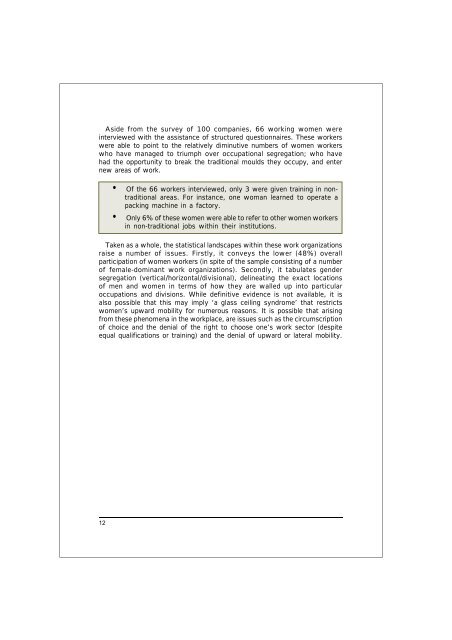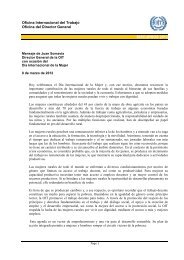Beyond Glass Ceilings and Brick Walls - International Labour ...
Beyond Glass Ceilings and Brick Walls - International Labour ...
Beyond Glass Ceilings and Brick Walls - International Labour ...
You also want an ePaper? Increase the reach of your titles
YUMPU automatically turns print PDFs into web optimized ePapers that Google loves.
Aside from the survey of 100 companies, 66 working women were<br />
interviewed with the assistance of structured questionnaires. These workers<br />
were able to point to the relatively diminutive numbers of women workers<br />
who have managed to triumph over occupational segregation; who have<br />
had the opportunity to break the traditional moulds they occupy, <strong>and</strong> enter<br />
new areas of work.<br />
• Of the 66 workers interviewed, only 3 were given training in nontraditional<br />
areas. For instance, one woman learned to operate a<br />
packing machine in a factory.<br />
• Only 6% of these women were able to refer to other women workers<br />
in non-traditional jobs within their institutions.<br />
Taken as a whole, the statistical l<strong>and</strong>scapes within these work organizations<br />
raise a number of issues. Firstly, it conveys the lower (48%) overall<br />
participation of women workers (in spite of the sample consisting of a number<br />
of female-dominant work organizations). Secondly, it tabulates gender<br />
segregation (vertical/horizontal/divisional), delineating the exact locations<br />
of men <strong>and</strong> women in terms of how they are walled up into particular<br />
occupations <strong>and</strong> divisions. While definitive evidence is not available, it is<br />
also possible that this may imply ‘a glass ceiling syndrome’ that restricts<br />
women’s upward mobility for numerous reasons. It is possible that arising<br />
from these phenomena in the workplace, are issues such as the circumscription<br />
of choice <strong>and</strong> the denial of the right to choose one’s work sector (despite<br />
equal qualifications or training) <strong>and</strong> the denial of upward or lateral mobility.<br />
12
















